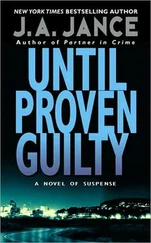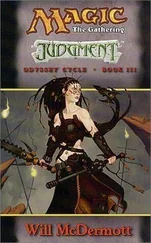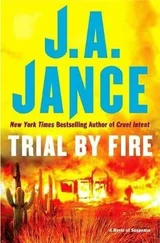“On the first count of homicide in the second degree, we find the defendant guilty.”
Bobby Fletcher shuddered and covered his face with his hands, sobbing silently as the jury forewoman continued: “On the second count of homicide in the second degree, we find the defendant guilty. On the third count of homicide in the second degree, we find the defendant guilty. On the charge of assaulting an officer of the law, we find the defendant innocent. On the charge of resisting arrest, we find the defendant guilty.”
The last two struck Joanna as incomprehensible hairsplitting. How could someone be innocent of physically assaulting an officer—something Joanna had witnessed with her own eyes—and at the same time be guilty of resisting arrest? But Bobby Fletcher had heard the single word he needed to hear. Alma DeLong was guilty of killing his mother. She had been free on bail. Now, once the judge granted the prosecutor’s request to rescind her bail, a deputy stepped forward to lead her across the parking lot to the county jail, where she would be held while awaiting sentencing.
Walking side by side, Joanna and Bobby Fletcher moved to the courtroom door, where Bobby came to a sudden stop. “I want to wait here and talk to Mr. Jones,” Bobby said. “I want to thank him.”
Not eager to face the media throng that was no doubt assembled outside, Joanna waited, too, but she was also amazed. Bobby had spent huge chunks of his adult life as a prison inmate. The idea of his having a cordial conversation with any prosecutor on the planet was pretty much unthinkable. But then, to Joanna’s astonishment, when Arlee Jones appeared, she found herself in for an even bigger shock. The county attorney approached Bobby Fletcher with his hand outstretched and a broad smile on his face.
“We got her,” the county attorney gloated, pumping Bobby’s hand with congratulatory enthusiasm. “We still have the sentencing process to get through, but one way or another, Alma DeLong is going to jail, starting today. Her bail may yet be reinstated, pending an appeal, but for now she’s a guest in your establishment, Sheriff Brady. Unfortunately, the accommodations there will be somewhat better than what her victims experienced at Caring Friends.”
“Thank you, sir,” Bobby Fletcher said.
“You’re welcome, Mr. Fletcher,” Arlee replied. “I’m not sure I ever mentioned this, but back when I was a kid, I used to deliver newspapers to your folks’ place over on Black Knob. Even when times were tough, your mom always made sure I got a tip when I came around collecting. Depending on whether it was winter or summer, she also offered me either hot chocolate or iced tea. Inez Fletcher was a good woman. Sending her killer to jail is the least I can do.”
The unguarded sincerity in that statement caused Arlee Jones to move up several notches in Joanna’s estimation. She usually dismissed Jones as being a pompous ass in a mostly empty suit. Now she momentarily reconsidered that opinion. And that was the thing that Alma DeLong hadn’t realized, either. Bisbee was a small town. The invisible spiderweb of connections running from one person and one family to the next was another reason Arlee Jones had tackled this case with unaccustomed zeal.
“So are you ready to talk to some reporters?” Jones asked.
“Who, me?” Bobby asked. A look of dismay spread across his face. “Are you kidding?”
“Yes, you,” Arlee said, placing a guiding hand on Bobby’s shoulder. “And I’m not kidding. As far as the people following this trial are concerned, you’re the living face of the victims. You’re the stand-in for every family that ever made the mistake of placing a loved one in a Caring Friends facility. You and the other families did so expecting that their father or mother or grandmother would be well cared for, even though we know now that that wasn’t the case.
“Having you speak to reporters tonight serves two purposes. It shows families that they can’t just drop their loved ones off at one of these places and then not monitor what goes on once the doors slam shut. They have to be vigilant. And it also serves to show people like Alma DeLong that if they deliver inadequate care, there will be consequences. Can you do that?”
“All right,” Bobby said uncertainly. “I guess.”
Witnessing this, Joanna felt her approval needle on Arlee Jones dip back down a bit. No doubt the man would make plenty of political hay from this incident. Having Bobby standing beside him during the press conference would provide a compelling segment on the evening news, and it would probably allow him to bank any number of sound bites that would work well the next time Arlee had to stand for election.
Joanna followed the two men out onto the covered outdoor breezeway. Content to be on the sidelines for a change, she stood next to Arlee Jones and listened in while a number of reporters piled on with a bombardment of questions. To Joanna’s surprise, Bobby Fletcher answered all of them in the unassuming but straightforward manner that had made him an effective prosecution witness during the trial. He hadn’t just dropped his mother off at the facility. He had seen the quality of care going down the tubes, and his attempts to rectify the situation had come to nothing.
All Joanna had to do was listen and smile and nod. The press conference ended without her having been asked a single question. That was exactly how she liked it, and her makeup had been on straight and her hair had been combed properly. Things didn’t get any better than that.
Once the press conference was over, however, a glance at her watch told Joanna she was running late. The day-care facility closed at six, and she had exactly five minutes of grace time to pick up Dennis. After that, she would begin accumulating late fines to the tune of twenty-six dollars for every additional five-minute period. Being late was not an option.
Joanna raced out through the back door of her office, jumped into her Yukon, and headed for Dr. Millicent Ross’s veterinary office in Bisbee’s Saginaw neighborhood, calling Jenny’s cell phone as she went.
“I’m on my way,” she told her daughter. “Meet me outside. Then I’ll drop you off at the church so you can go in and sign Dennis out. If I have to mess around with finding a parking place there, we’re not going to make it on time.”
As directed, Jenny stood by the entrance to the clinic’s driveway, leaning against a gatepost with one strap of her backpack flung over her shoulder. A stiff breeze blew in out of the north, and Jenny’s long ponytail fluttered like a blond flag in the turbulent air. Back in high school, Joanna had been a tiny redhead who had often been referred to as “cute.” Jenny, on the other hand, was beautiful in a tall, slender, blue-eyed way that would never be considered cute.
It came as no surprise to Joanna that Jenny, an accomplished horsewoman, would be a natural choice for the title of Bisbee High School’s rodeo queen at some point in the course of her four years of high school. The surprise had been in the timing. Joanna had expected it to happen later on. Being rodeo queen as a senior would have been just about right, but Jenny had won the crown as a mere junior, leaving Joanna as the mother of a rodeo queen somewhat earlier than she’d thought possible.
Once she had made the mistake of mentioning all of that to her own mother. Eleanor Lathrop Winfield had responded with a singular lack of sympathy.
“It’s one of those surprises that comes with being a parent, and you don’t even have time enough to dodge out of the way,” Eleanor had told her. “Besides, you’re better off as the youngish mother of a rodeo queen than being an underage grandmother.”
The implications in her mother’s statement were quite clear, as in, your daughter’s a fifteen-year-old rodeo queen. Mine was an unmarried, pregnant seventeen-year-old. Which do you prefer?
Читать дальше












